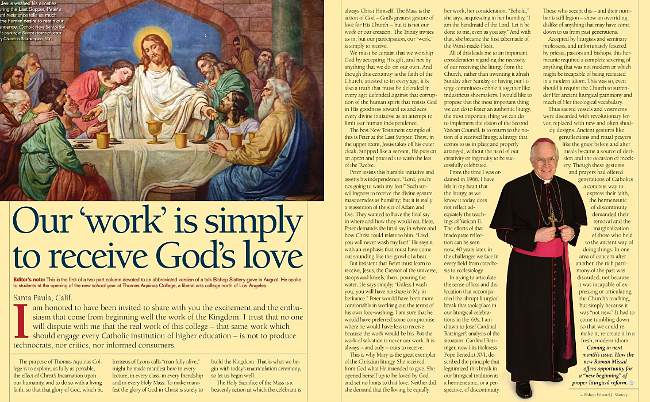
Biskop Edward Slattery i Tulsa, Oklahoma, USA, holdt i august i år et foredrag ved Thomas Aquinas College i Santa Paulua, California, et foredrag som nå trykkes i bispedømmets eget tidsskrift i noe forkortet form. I oktobernummeret kan vi lese første del. Jeg tar med starten av denne første delen, der biskopens poeng er at i messens hellige offer er det Kristus selv som handler, og vår oppgave er faktisk bare å ta imot:
The Holy Sacrifice of the Mass is a heavenly action at which the celebrant is always Christ Himself. The Mass is the action of God – God’s greatest gesture of love for His Church – but it is not our work or our creation. The Trinity invites us in, but our participation, our “work,” is simply to receive.
We must be certain that we worship God by accepting His gift, and not by anything that we do on our own. And though this certainty is the faith of the Church, attested to in every age, it is also a truth that must be defended in every age; defended against that corruption of the human spirit that resists God in His goodness toward us and sees every divine initiative as an attempt to limit our human independence.
The best New Testament example of this is Peter at the Last Supper. … insistent that Peter must learn to receive, Jesus, the Creator of the universe, stoops and kneels; then, pouring the water, He says simply, “Unless I wash you, you will have no share in My inheritance.” Peter would have been more comfortable in working out the terms of his own foot-washing. I am sure that he would have preferred some compromise where he would have less to receive because the work would be his. But the work of salvation is never our work. It is always – and only – ours to receive.
This is why Mary is the great exemplar of the Christian liturgy. She received from God what He intended to give. She opened herself up to be loved by God and set no limits to that love. Neither did she demand that the loving be equally her work, her consideration. “Behold,” she says, acquiescing in her humility, “I am the handmaid of the Lord. Let it be done to me, even as you say.” And with that, she became the first tabernacle of the Word-made-Flesh.
All of this leads me to an important consideration regarding the necessity of our receiving the liturgy from the Church, rather than inventing it afresh Sunday after Sunday, or having our liturgy committees cobble it together like industrious shoemakers. I would like to propose that the most important thing we can do to foster an authentic liturgy, the most important thing we can do to implement the vision of the Second Vatican Council, is to return to the notion of a received liturgy, a liturgy that comes to us in place and properly arranged, without the need of our creativity or ingenuity to be successfully celebrated.
Jeg skrev også om biskop Slattery i august 2009, etter at han begynte å feire messene i sin egen domkirke ad orientem.
